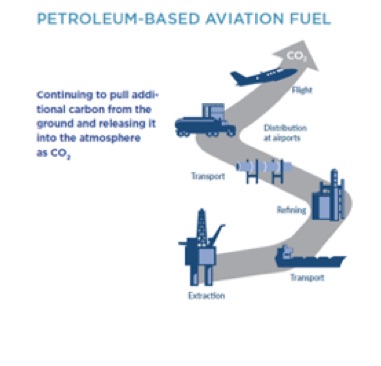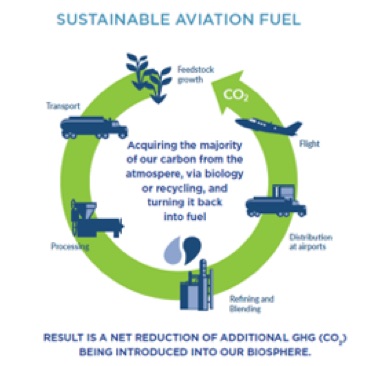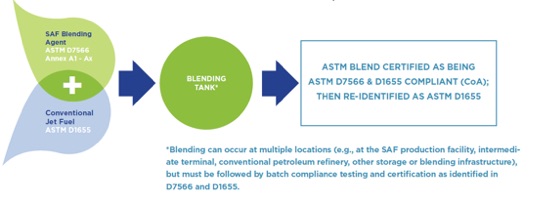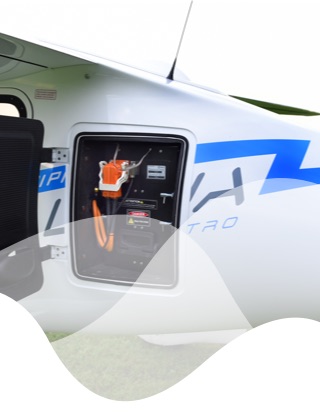For turbine-powered aircraft currently using conventional jet fuel, the single-largest potential reduction in aviation’s GHG emissions — and a key to reaching goals for reducing them — will come about through the broad adoption of SAF. While other clean alternatives to fossil fuels are being developed for future use in addition to SAF (e.g., electrification and hydrogen fuel), but these remain longer-term alternatives, whereas SAF has been proven to work, and is ready to be scaled up today.
Burning SAF still emits CO2 in the same way as kerosene but the difference is that SAF product extracts this same amount of CO2 from the atmosphere when the feedstocks are grown. Additionally, use of SAF will reduce operational emissions of sulphur oxides, particulate matter and carbon monoxide.
What is SAF?
What is a blended fuel?

An SAF blend is a mixture between conventional fuel and unconventionally synthesized mixing agents. SAF can come from various sources whose chemical constituents can be converted into the pure hydrocarbons that usually make up jet fuel.
For now, SAF are used in mixtures with kerosene (blended up to 50% with conventional jet fuel) but they are expected to be used pure. Biofuels can thus be blended until their production is sufficient to continuously supply the air transport industry.
Achieving Net Lifecycle GHG Reductions With SAF


Source: FUELING THE FUTURE, Sustainable Aviation Fuel Guide, Edition 2 | 2020, page 6
About certification
Many political and regulatory authorities support the development of sustainable fuels. In addition, the European Union has set up the European Green Deal to combat climate change and support the production and use of SAF.
In order to enable the safe development of SAF in aviation, a certification procedure has been set up at the international level (ASTM International). These fuels must meet the properties and performance requirements demanded by engine and aircraft manufacturers and be approved by aviation safety authorities. There are two fuel quality standards: ASTM D1655 governing the quality of jet fuel placed on the market and ASTM D7566 governing the quality of alternative fuels.
Any SAF meeting the requirements of ASTM D7566 is recognized as meeting the characteristics of conventional petroleum-based jet fuel approved to ASTM D1655.
The SAF has undergone numerous testing programs to meet the requirements of ASTM D1655 (known as Jet-A, or Jet A-1). These sustainable fuels have been tested by manufacturers too. In addition, political and regulatory bodies (e.g. EASA) have issued guidance for the use of FAS, following a blend that has been re-identified and certified as meeting ASTM D1655 standards for turbine-powered aircraft.

Source: FUELING THE FUTURE, Sustainable Aviation Fuel Guide, Edition 2 | 2020, page 15
Purchasing SAF today
Conventional jet fuels derived from crude oil are easy to produce, easy to process, easy to store, and depending on the global oil price, generally affordable. The primary challenge for SAF is to be able to produce it at a competitive price. Increased volumes over time are expected to lead to lower costs due to economies of scale.
At this time, SAF is not widely available, but this is expected to change. There are currently a limited number of airports and operators using SAF on a routine, ongoing basis. Business Aviation manufacturers and fuel suppliers are also working to help business aircraft operators increase their use of SAF. Several Business Aviation operators and manufacturers have secured contracts with suppliers for SAF. Most of the manufacturers and operators use these fuels on a routine basis to satisfy sustainability goals, and have undertaken many high-profile flights using SAF.
The industry is trending in the right direction, with the use of SAF steadily expanding around the globe, driven by a desire to be a responsible steward of the environment.
You want to know more about new technology opportunities?
You want to know more about new technology opportunities?
Check these links below
Sustainable Aviation Fuel (futureofsustainablefuel.com)





